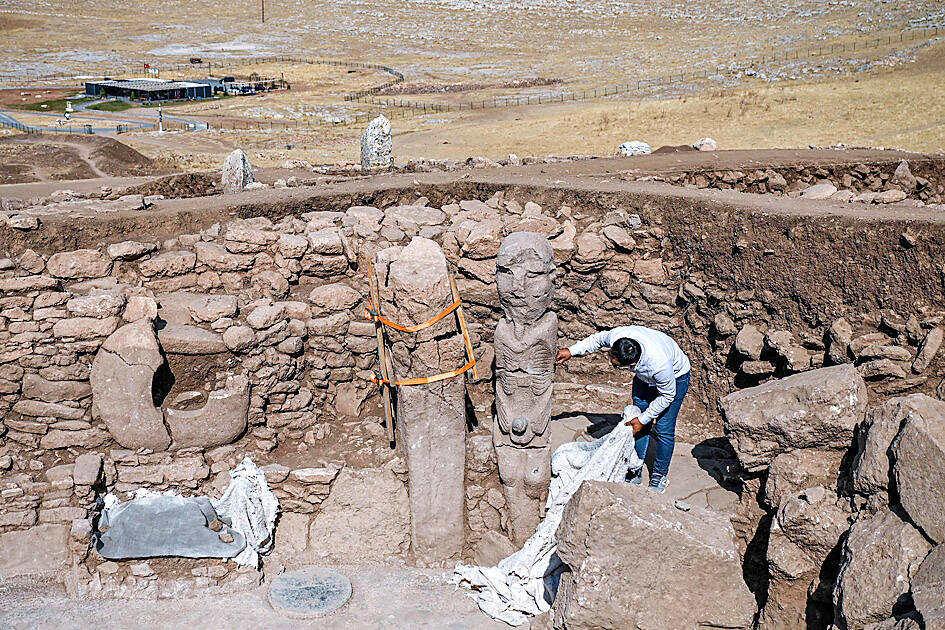The dry expanses of southeastern Turkey, home to some of humanity’s most ancient sites, have yielded fresh discoveries in the form of a stone phallus and a colored boar.
For researchers, the carved statue of a man holding his phallus with two hands while seated atop a bench adorned with a leopard, is a new clue in the puzzle of our very beginnings.
The 2.3m statue was discovered at the end of September at Karahantepe, in the heart of a complex of about 20 sites that were home to thousands of people during the Stone Age.

Photo: AFP
Karahantepe is part of the network around UNESCO-listed Gobekli Tepe, a place where our prehistoric ancestors gathered to worship more than 7,000 years before Stonehenge or the earliest Egyptian pyramids.
Necmi Karul, who heads Istanbul University’s Department of Prehistoric Archeology, found the toppled statue that was broken into three sections.
“We found several statues of this kind ... but for the first time here we found the phallus,” said the archeologist, who coordinates the work of a project focused on the area’s settlements.

Photo: AFP
The man lay in one of the first rectangular buildings, probably as a pillar supporting the wooden roof — clues to how people used the site.
Karul said that these settlements bear witness to “a new social order born after the Ice Age.”
“The main reason to start a new kind of architecture is to build a new type of society,” he said.
Gobekli Tepe — which some experts believe was never actually inhabited — might be part of a vast sacred landscape that encompasses other nearby hilltop sites that archeologists believe could be even older.
However, the first modest photographs of the statue released by the Turkish Ministry of Culture and Tourism led the local press to suspect censorship in the nation that has turned conservative under Turkish President Recep Tayyip Erdogan.
“We are archeologists, censorship doesn’t exist. We had not yet found a phallus,” Karul said, laughing.
Yet there is meaning hidden in the discovery.
“Before leaving a site they [residents] used to crash the pillars and the statues — but before, they broke the nose and the phallus,” he said.
Then the site was filled in, buried under tonnes of sand and earth. Its function remains unknown as do the reasons for the sudden abandonment and destruction of place after apparently hundreds of years of use.
The largest room at the site, surrounded by smaller rooms, seems to have been a kind of gathering place accessed via a narrow passageway, supported by a forest of phallus-shaped pillars topped by a man’s head carved out of the rock.
“Those who entered here knew the symbols ... they knew the meaning. It told them a story, but we don’t know it,” Karul said, adding that no female figures have been found.
Perhaps they were made of wood, he said, hazarding a guess.
No sooner had Karul unearthed the Karahantepe man, when he made another discovery the same week at Gobekli Tepe.
Archeologists found a 1.2m long by 70cm high depiction of a boar, with red eyes and teeth, as well as a black and white body.
The 11,000-year-old wild pig is the first colored sculpture from this period discovered to date, Karul said.
The site was occupied for about 1,500 years before being abandoned. Of the 20 area sites in the Tas Tepe (Stone Hills) project that is coordinated by Karul — which stretches over 120km not far from the border with Syria — only nine are being excavated.
“Work for the next 150 years,” said Karul, adding that the man and the boar would remain where they emerged from the earth, but with the necessary measures to safeguard them.

STEPPING UP: Diminished US polar science presence mean opportunities for the UK and other countries, although China or Russia might also fill that gap, a researcher said The UK’s flagship polar research vessel is to head to Antarctica next week to help advance dozens of climate change-linked science projects, as Western nations spearhead studies there while the US withdraws. The RRS Sir David Attenborough, a state-of-the-art ship named after the renowned British naturalist, would aid research on everything from “hunting underwater tsunamis” to tracking glacier melt and whale populations. Operated by the British Antarctic Survey (BAS), the country’s polar research institute, the 15,000-tonne icebreaker — boasting a helipad, and various laboratories and gadgetry — is pivotal to the UK’s efforts to assess climate change’s impact there. “The saying goes

Police in China detained dozens of pastors of one of its largest underground churches over the weekend, a church spokesperson and relatives said, in the biggest crackdown on Christians since 2018. The detentions, which come amid renewed China-US tensions after Beijing dramatically expanded rare earth export controls last week, drew condemnation from US Secretary of State Marco Rubio, who on Sunday called for the immediate release of the pastors. Pastor Jin Mingri (金明日), founder of Zion Church, an unofficial “house church” not sanctioned by the Chinese government, was detained at his home in the southern city of Beihai on Friday evening, said

TICKING CLOCK: A path to a budget agreement was still possible, the president’s office said, as a debate on reversing an increase of the pension age carries on French President Emmanuel Macron yesterday was racing to find a new prime minister within a two-day deadline after the resignation of outgoing French Prime Minister Sebastien Lecornu tipped the country deeper into political crisis. The presidency late on Wednesday said that Macron would name a new prime minister within 48 hours, indicating that the appointment would come by this evening at the latest. Lecornu told French television in an interview that he expected a new prime minister to be named — rather than early legislative elections or Macron’s resignation — to resolve the crisis. The developments were the latest twists in three tumultuous

FIRST STAGE: Hamas has agreed to release 48 Israeli hostages in exchange for 250 ‘national security prisoners’ as well as 1,700 Gazans, but has resisted calls to disarm Israel plans to destroy what remains of Hamas’ network of tunnels under Gaza, working with US approval after its hostages are freed, it said yesterday. Israeli Minister of Defense Israel Katz said that the operation would be conducted under an “international mechanism” led by the US. “Israel’s great challenge after the hostage release phase will be the destruction of all Hamas terrorist tunnels in Gaza,” Katz said. “I have ordered the army to prepare to carry out this mission,” he added. Hamas operates a network of tunnels under Gaza, allowing its fighters to operate out of sight of Israeli reconnaissance. Some have passed under